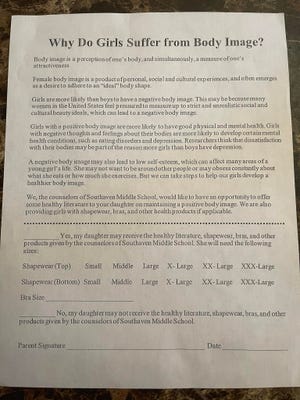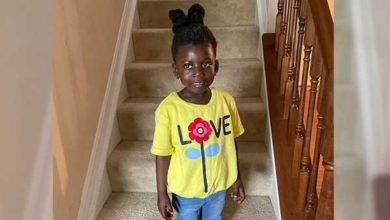
SOUTHAVEN, Miss. — When Ashley Heun's daughter came home Tuesday from her eighth grade classes at Southaven Middle School, she had a letter to show her mom.
The letter, titled, "Why Do Girls Suffer from Body Image?" had been handed out to the girls while they were in class, her daughter said. It talked about how girls are more likely than boys to have a negative body image and the physical and mental benefits to having a positive body image.
"We, the counselors of Southaven Middle School, would like to have an opportunity to offer some healthy literature to your daughter on maintaining a positive body image," the letter reads. "We are also providing girls with shapewear, bras and other health products if applicable."
At the bottom, there was a place for parents to check yes or no on if their daughters may receive "the healthy literature, shapewear, bras and other products given by the counselors of Southaven Middle School." It also offered a section for parents to check which sizes their girls would need.

"I had to read it a few more times, to make sure I was actually reading what I was actually reading," Heun said. "I mean, I was shocked, I was absolutely shocked. And honestly, I was angry."
Heun waited a few hours in order to calm down and clear her head, and then she emailed the principal, John Sartain, to outline her concerns.
"There it was, though, in all its glory, offering my daughter SPANX," the email she sent reads. "My 13-year-old daughter. Shapewear. If my daughter begged me for shapewear, I would tell her no. I would be concerned about her if she even asked. Now I find out that you are ENCOURAGING her to wear it."
Sartain called Heun on Wednesday morning. He explained that the school had received a donation of bras, underwear and shapewear and had implemented the program to distribute them to anyone who needed them. The program, he said, had been canceled after Heun and others raised concerns.
The district confirmed Wednesday afternoon that the program had been canceled and that district officials understand how "this type of information causes serious concern from parents."
"While I know they had good intentions, it was just very ill conceived," Heun said. "And I appreciate the fact that they want to help, because there are girls out there who don't have access to bras or other essential items, for whatever reason.
"It's amazing that the school would be in a position to help girls out who needed that, but just sending a letter out to all the girls in the school saying 'body image is a problem,' but offering to give them shapewear? That basically says 'we know that you don't have a perfect body, so here is something to help you alter your appearance.'"
The letter also demonstrates a potential Title IX violation, Memphis attorney Brice Timmons said, albeit a bit of a strange Title IX violation.
"Here, because it is specifically targeted at female students, and because it has the effect, presumably has the effect of making a number of those students feel particularly ashamed and singled out in such a way that it probably has negative psychological effects that impact their ability to function in an education environment, I think it's certainly this type of thing that would be covered by Title IX," Timmons said. "It's such a strange decision on the part of the school that I doubt very seriously that it was exactly what Title IX drafters had in mind."
Had the school offered both the boys and girls free shapewear and undergarments, Timmons said, it would not have constitute a Title IX violation.
"I don't think it would have violated Title IX because they wouldn't be treating female students differently from male students," Timmons said. "They would just have been engaging in something foolish with regards to all their students."
Heun is happy to say her daughter declared the letter to be "stupid" and didn't think anything else of it. But Heun is worried about the other students in the eighth grade class who might not have been able to brush the letter off as easily.
A 2015 study published by the journal "Adolescent Health, Medicine and Therapeutics" titled "Weight status and body image perceptions in adolescents: current perspectives" shows that for girls ages 12-18, the pressure to lose weight is already significant.
"Other factors contributing to the complex relationship between weight status and body image include social influences, such as social comparison, fat talk, and weight-related bullying," the study reads. "Social comparison, which is the tendency to compare one’s body or physique to that of others (i.e., often someone within a peer or friendship group), is especially relevant among adolescents."
Heun has tried to work to ensure that her daughter doesn't have any of the issues with body image that she had growing up.
"I have worked really hard to not project my own body images, my own negative body image, to my daughter," Heun said. "I've tried really hard not to bad mouth how I look in front of her, so that she would putting those words in her own head about herself. And they have so much more pressure than we did when we were younger, when we didn't have social media, and didn't have the added pressure of filters and everybody's trying to outdo everybody else on Instagram or whatever."
Heun said Sartain was very apologetic when he called and she hopes the incident can serve as a learning experience for everyone involved. "And honestly it almost seems like this is something out of the '50s," Heun said.
Follow Gina Butkovich on Twitter: @gigibutko










